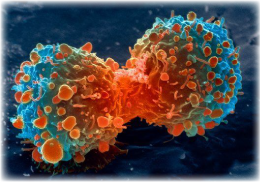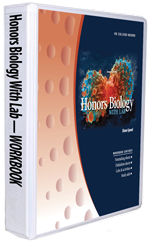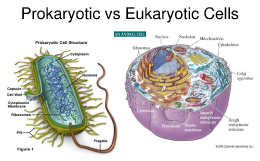|
ONLINE COURSES IN SCIENCE
Honors Biology With Lab
Live instruction in scientific knowledge & skills
 This year-long, honors-level course focuses on molecular biology. Our instructor assigns college-level texts, employs university websites, and leads her students through AP-level labs. This year-long, honors-level course focuses on molecular biology. Our instructor assigns college-level texts, employs university websites, and leads her students through AP-level labs.
But in content and in purpose, this course is quite different from an AP course. An AP course must cover a vast number of topics at a rapid pace — and for good reason: the instructor's first duty is to prepare the student for the AP test, which is broad in scope. For this reason, the AP instructor assumes that the student has already studied each topic elsewhere.
This course, by contrast, goes into real depth on core topics. The aim is that each student acquire a deep understanding of biology and the essentials of biochemistry, as well as an appreciation of life's wonder and majesty; students new to science and those with previous knowledge are equally welcome. At the same time, this course goes beyond simple knowledge transfer; it helps students develop vital skills, many of which they'll use in all their future science studies:
- reasoning & analysis;
 taking notes in a live lecture; taking notes in a live lecture;- taking notes as you read & annotating the text;
- using the language of science to articulate questions, ideas, & observations;
- building scientific vocabulary around the core topics.
The instructor coaches and supports her students in developing all of the above skills. In addition, her students complete two research projects in which they not only practice research skills but design & deliver an online presentation.
Each lecture begins with broad foundational concepts and then delves into the topic in greater detail. Lectures feature video, graphics, and PowerPoint presentations. We ship to each student a 348-page workbook of beautiful materials (right) — graphics depicting cells, biological molecules, biochemical processes — plus in-class note-taking sheets, worksheets for labs, and worksheets to be completed at home.
Among the topics covered in this year-long course:
Preview the workbook
To preview the 348-page workbook for this course, simply click on the image above.
- Fall Semester: molecular biology, basic chemistry, biochemistry (proteins, fats, carbohydrates, enzymes), the cell, cell membranes, osmosis, diffusion, respiration, and photosynthesis.
- Spring Semester: DNA replication, protein synthesis, meiosis, mitosis, genetics (classical and molecular), phylogeny, anatomical forms & systems.
Workload
Texts to purchase
Here are the items needed for Honors Biology With Lab — all links below are to the correct editions on Amazon:
Workbook for this course (see image directly above this box) included in course fee — and shipped to your door.
This honors-level class moves at quite a clip. Each week comprises:
- instruction — three live one-hour sessions (3 hours per week), including lecture, labs, review of lab analyses, or other activities;
- homework — an average of 5 hours of independent homework. These assignments will comprise reading, annotating text, watching videos, completing worksheets, doing independent research, writing lab analyses, and studying.
Among the activities in this course:
- Live interaction. Students interact with the teacher and other students online, hear lectures, view images, and ask and answer questions.
- Research projects. Students are assigned two in-depth research topics to research independently.
- Quizzes. Periodic quizzes are administered and reviewed. The objective of these quizzes will be learning and mastering the content, not generating a grade.
- Tests adaptable to your homeschooling. Five tests are provided to parents to administer at home as they wish — open-book, closed-book, as a learning tool, as a grade generator, or any combination.
 Our labs Our labs
Each lab correlates to class content. Over the course of the year, students will:
- be instructed on lab set-up and analysis;
- use the scientific method to analyze data and draw conclusions in written analyses.
Students regularly perform labs in some combination of paper, simulations, or wet — roughly five labs per semester.
At the beginning of each wet lab, to ensure proper set-up and use of lab apparatus, the teacher demonstrates and explains. Students then run their own labs but can interact with the teacher throughout the live, online session.
About the instructor
Diane Speed was the founder of Connecticut's Classical Kids Network, and she is co-founder of HS College-Bound. She has a B.S. in biology from Drexel University, as well as a minor in chemistry. Before marrying, Diane worked in laboratories at SmithKline Pharmaceuticals (antibiotic development), Temple University Research labs (hemophilia/clotting factors), and the Philadelphia Water Department (water purity). Diane has been teaching biology to homeschooled highschoolers since 2013.
|
|
|
2024 registration is now open!
FALL 2024 – SPRING 2025
Students attend three classes
per week, beginning August 27:
Tuesdays 10:30 – 11:30 am EST
Thursdays 10:30 – 11:30 am EST
Fridays 10:30 – 11:30 am EST
To register a student, click here:

To contact the instructor, click here.
Fee for entire year: $ 1340.
Up to July 15:
Register with a deposit.
Now through July 15, 2024, secure your student's seat with a 50% deposit ($ 670.);
the balance is due on September 1, 2024
(we'll invoice you).
After July 15:
Pay in full.
The entire fee is due at registration.
View our weekly schedule
for 2024–25
Our approach to ...
Science
 At HS College-Bound we offer science at two levels: At HS College-Bound we offer science at two levels:
- Science Intensives. These courses are of short duration, e.g. eight weeks, and are targeted to students in advanced middle school or beginning high school.
- Year-long, honors-level courses. Our honors-level courses are targeted to high school students. They employ college texts, websites from universities, AP-level labs, and in-depth explorations.
Sciences at HS College-Bound aim high: all content is taught by subject-matter experts who are passionate about their disciplines. At the same time, we provide in-depth science content for two kinds of students:
- those new to the formal study of science;
- those who have already studied science deeply for years.
In order to ensure learning and mastery of concepts, moreover, the content is taught in a tiered fashion — laying foundational concepts, building up knowledge, delving deep into the facts, and reinforcing by looping back to essential concepts covered earlier in the course.
These methods ensure that no student is left behind. Rather, students come away with a full picture of the science and the interconnectedness of topics. Students with more science acumen can learn deeply while students new to the discipline learn comprehensively.
A more detailed look at our methods:
- Multimedia. Our science courses are taught primarily through lecture, targeted activities, and readings. But all these methods are supplemented by video, images, or animations whose purpose is to depict processes and events that are sometimes invisible and often liable to seem abstract — like cellular activity, chemical compounds, biochemical and physical processes, etc.
- Research projects. Students are assigned in-depth research projects to deepen their understanding of the history of science and the development of scientific knowledge. All students are required to present in class and online.
- Labs. All labs correlate to class content. Students use the scientific method to analyze data and draw conclusions in written reports.
- Tests. Tests are provided to parents to administer at home as they wish — open book, closed book, as a learning tool, as a grade generator, or any combination.
- Homework. Typically four to five hours of per week — reading, annotating text, watching videos, completing worksheets, doing independent research, writing lab reports, and studying.
[This instructor] runs a fantastic biology class. Her enthusiasm is readily passed on. The material can be challenging, but she takes the time to explain things in a way that the student understands, even on her own time before or after class. She uses a wide variety of printed materials, videos, PowerPoint slides—all together they paint a clear picture that really facilitates learning. I have found that my own son had not just memorized the material but actually understood it. On a practice test, for instance, when he came across unfamiliar questions, he was able to reason his way with confidence to the correct answers.
—Homeschooling mom
|
|
![]()